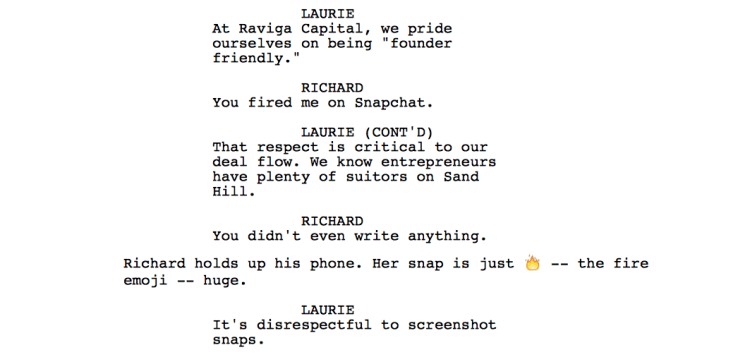 HBO’s Silicon Valley
is a show pretty much based on an entire industry’s lack of
self-awareness. Richard, Erlich and the rest of Pied Piper are
always cringingly painful to watch as they thrive in a startup culture
that is just so entertaining to dissect.
HBO’s Silicon Valley
is a show pretty much based on an entire industry’s lack of
self-awareness. Richard, Erlich and the rest of Pied Piper are
always cringingly painful to watch as they thrive in a startup culture
that is just so entertaining to dissect.The show just finished up its second season and the third doesn’t begin for another eight months. To most fans that’s just a bummer.
Blake Ross, a guy who knows a thing or two about startups (he founded Firefox and previously worked at Facebook and Netscape), took it more to heart.
Last night, Ross published an original screenplay of a new episode of the show on his site, saying in a Facebook post, “I couldn’t wait 8 more months for season 3 of Silicon Valley to start, so I spent the past 48 hours writing my own episode. It picks up where season 2 left off.”
What results is a screenplay that’s hilariously on-point, complete with some ridiculous antics from the central characters who move through a plot line involving Richard hiring his own CEO replacement while juggling the possibility of moving his company to be open-source.

Give the full thing a read here.
What is perhaps coolest about this screenplay is that it’s written by a guy that’s spent his whole life at the forefront of some pretty high-profile tech companies. Ross came to Silicon Valley as a wiz kid at age 14 and has spent his whole life navigating the bizarre culture where he said he’s seen “some pretty ridiculous things.”.
I caught up with Ross and he revealed some of his inspirations for the episode and how he thinks everyone who writes for the show should probably have to work for AOL for at least a year to get a true sense of how crazy this place is.
Below is the full Q&A with Ross:
TC: So what inspired you to do this?
BR: I came out to work in Silicon Valley when I was 14, so I basically came of age here and have seen some pretty ridiculous things.
I write about them in essays sometimes, but I wanted to try expressing my love and hate for this place through the awesome characters they’ve created on the show.
TC: What main things were you trying to poke fun at in this episode?
BR: Hmm that’s tough to answer, almost rather let the script speak for itself. I do think there’s some cognitive dissonance when you see the pitiful diversity reports that come out from major tech companies, and meanwhile some demographics are so overrepresented that people are actually running multiple companies at once.
Open source is always an easy target. Companies often pay it lip service just to juice recruiting pipelines or other reasons that have little to do with how it’s presented to the world.
My first job out here was at Netscape shortly after it was purchased by AOL and they were getting desperate, so I got to see a lot of the craziest stuff all at once.
TC: Haha good old AOL.
BR: I’m honestly amazed they’re still around.
TC: Do you think the show does a good job of representing the industry/culture in general? Is there any place where you think it falls short?
BR: Sometimes I wish they chose a more relatable product for Pied Piper than compression technology, because I want people to understand what goes into building the products they use every day and how the decisions get made. The gulf between what actually goes on behind the scenes at Facebook and what people imagined was happening is so wide. We’d read these really elaborate, almost brilliant conspiracy theories and the truth was, well, no, someone tripped on the cord that day and unplugged the servers.
A lot of people still just don’t know how these technologies work, and so they sometimes fill in the gaps with pretty dark assumptions. I think Silicon Valley has a chance to show what is really happening in a way that is funny but also authentic — sort of like Jon Stewart. The companies themselves can’t do it because it just comes off as a marketing agenda.
I once told a clerk I worked at Facebook, and she said, “what do you mean? I thought it was a website.” I mean, how do you answer that?
But the show is fantastic on the whole. I’d love to write for it.
TC: Is there anything else you want to add or put out there about this screenplay?
BR: It’s the first TV script I’ve ever written, so I’d love constructive feedback from fans of the show. Which situations feel too broad, which dialogue doesn’t feel true to character, and so on. If people are interested, I may try to write a whole season before the real season airs in April. The beauty of it is that there’s no lag time for filming, so when something absurd happens in the valley on Wednesday, I could theoretically turn it into a premise by Thursday.
So basically, people should just shoot me a note every time something absurd happens at their company.

h/t Chris Kalani